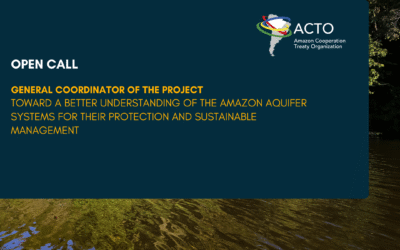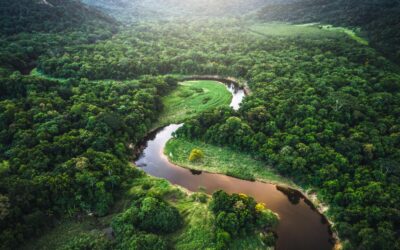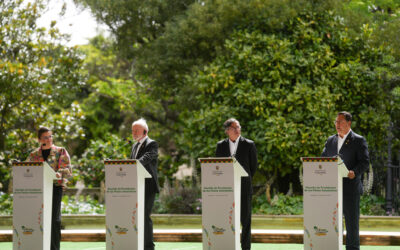With the collaboration of PAHO and the Ministries of Health of Brazil, Ecuador, Bolivia and Colombia, ACTO, ORAS, HIVOS and GIZ, the first webinar on international experiences and health information management in Amazonian indigenous peoples in border regions was held.
On July 20, the Peruvian Ministry of Health (MINSA), with the collaboration of the Pan American Health Organization (PAHO) and the Amazon Cooperation Treaty Organization (ACTO), and with the participation of the Andean Regional Health Organization (ORAS-CONUS), the Humanist Institute for Development Cooperation (HIVOS), and with the support of the German Development Cooperation (GIZ); a virtual event was held to socialize effective interventions in mitigation, containment and vaccination against COVID-19 implemented in Indigenous Peoples of Peru, Brazil, Colombia, Bolivia and Ecuador.
As a follow-up to the initiative, on August 24, a webinar was held on “International experiences in the health of Amazonian indigenous peoples in border areas, in the context of the COVID-19 pandemic”.
In this virtual event, ACTO was represented by its Executive Director, Ambassador Carlos Alfredo Lazary, who highlighted the historical relevance of the activities in the protection of Indigenous Peoples in Isolation and Initial Contact (PIACI) in the Amazon Region, particularly carried out in the areas of the Strategic Framework for the Development of a Regional Agenda for the Protection of PIACI and the Indigenous Peoples in Border Regions Project, both activities carried out with the support of the Inter-American Development Bank (IDB).
The Executive Director of ACTO also expressed the importance of the products generated by these initiatives, such as the consensus instruments “Amazonian Guidelines for the Protection of IPACI” and “Concepts and Guidelines for the Protection of the Health of IPACI”, in addition to the recommendations on the promotion of Traditional Knowledge in the Management of Natural Resources and Health Guidelines for the Exchange of Information among ACTO Member Countries.
On the other hand, Lazary explained the importance of the Amazon Regional Observatory (ARO), which will have thematic modules, one of them on Indigenous Peoples. This module will focus on health, to strengthen the articulated and culturally relevant response capacity of the different national and local health services in emergency and post-emergency situations of COVID-19, in Indigenous Territories in border areas.
To complement the information on ACTO’s performance in its contributions to the fight against COVID-19, the technical team of the Contingency Plan for Health Protection in Highly Vulnerable and Initial Contact Indigenous Peoples project, implemented in cooperation with PAHO and with the support of the IDB, presented the components and current status of the activities being developed.
The event included a presentation by Dr. Alberto Lora Aguancha, Advisor to the Office of the General Secretariat of the Andean Community (CAN) -the most solid integration organization of the continent- considering as a priority the support in the vaccination against COVID-19 in indigenous peoples of Peru, Bolivia and Ecuador in order to improve the quality of life of the most vulnerable indigenous peoples of the region.
Likewise, Dr. Paolo Balladelli, Director of the Subregional Program for South America of PAHO/SAM spoke about the importance of strengthening support to the indigenous peoples of the Amazon Basin for the fulfillment of the 2030 agenda and the commitment of the countries to vaccinate all Amazonian indigenous people.
As part of the seminar, the supranational organizations shared their efforts, experiences and lessons learned from international cooperation in the health of indigenous peoples in the face of the Covid-19 health emergency, represented by: Dr. Maria del Carmen Calle, Executive Secretary of ORAS, Dr. Ana Isabel Moreno, Director of the GIZ Indigenous FFS Project; and Mgs. Catalina Campo, Coordinator of the HIVOS Amazon Indigenous Health Route Project.
The event included a technical round table where the need to promote health systems that guarantee the rights and respond to the needs of the population was highlighted, as well as the generation of scientific evidence for decision making and the strengthening of traditional medicine to combat the symptoms caused by COVID-19.
On the other hand, the representatives of the Ministries of Health of Brazil, Ecuador, Bolivia and Peru presented the progress made in the development of information management platforms for Indigenous Peoples, which include the publication of ordinances, technical reports, recommendations, clinical management protocols, epidemiological bulletins, protocols for action by Indigenous Health Teams, National and District Contingency Plan for Human Infection by the new Coronavirus in Indigenous Peoples; among others.
The speakers considered it key to promote the economic, social, cultural and political reactivation of the indigenous peoples of the countries of the region, the exchange of good practices and the design of innovative and inclusive strategies in favor of the Amazonian indigenous peoples, considering the current crisis caused by the pandemic in border areas.
Mr. Julio Mendigure Fernandez, Director of Indigenous and Native Peoples of the Ministry of Health, said that MINSA – as promoter of the platform – will continue to expand the spaces for participation in supranational integration mechanisms, through the development of international seminars on September 28 and October 26.
In this way, the Peruvian health sector, in collaboration with the German Development Cooperation and the PAHO/WHO Subregional Program for South America, have initiated the exchange of experiences, knowledge and common efforts in the health of Amazonian indigenous peoples, with emphasis on human rights, interculturalism and border work, in order to contribute to the implementation of strategies that address the social determinants of health and improve the quality of life of the populations that live and travel along the borders of the countries of Brazil, Colombia, Ecuador, Bolivia and Peru.
The webinar is available at: https://youtu.be/e3bVS81xpag.











